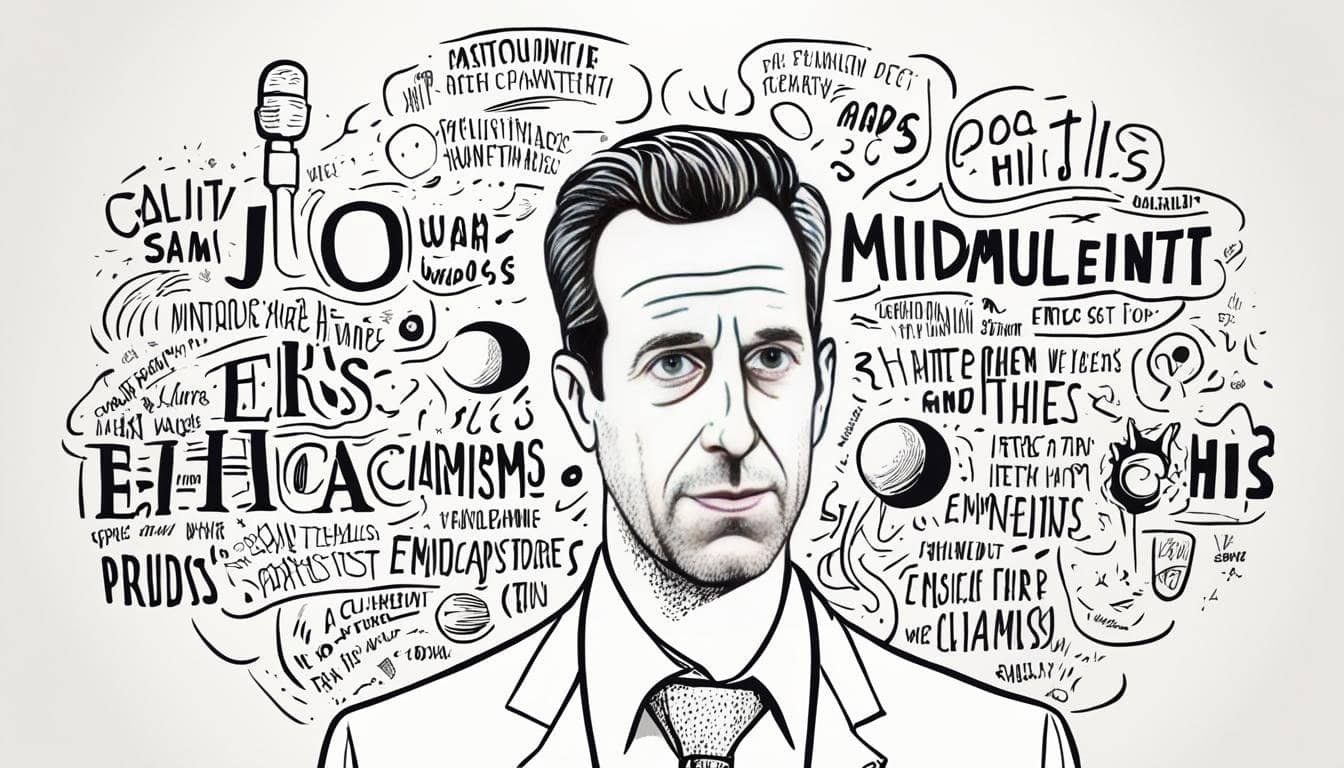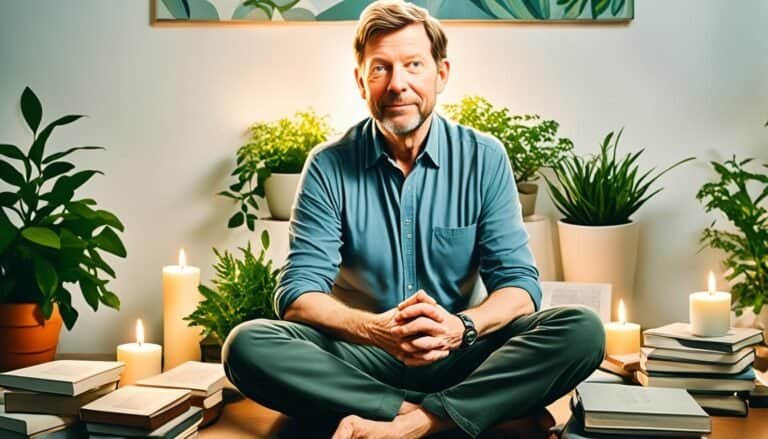Insights & Wisdom: Lessons from Sam Harris
“The fact that we can feel pain and happiness proves that our lives matter.” – Sam Harris
Sam Harris, renowned author, neuroscientist, and host of the popular podcast “Waking Up,” is a leading voice in the fields of mindfulness, philosophy, and rational thought. Through his insightful books, thought-provoking interviews, and transformative meditation practices, Harris has inspired countless individuals to explore the depths of their consciousness and live a more fulfilling life.
In this article, we delve into the profound lessons we can learn from Sam Harris, exploring his teachings on solitude, love, compassion, spirituality, and the power of meditation. By embracing these lessons and incorporating them into our daily lives, we can gain a deeper understanding of ourselves and the world around us, ultimately leading to greater happiness and personal growth.
Key Takeaways:
- By embracing solitude and mindfulness, we can cultivate personal growth and a deeper understanding of ourselves.
- Love and compassion extend beyond personal connections and can bring true happiness and fulfillment.
- Spirituality can be explored and understood beyond the confines of organized religion.
- Meditation is a transformative practice that allows us to uncover fundamental truths about our minds and find genuine happiness.
- Harris’s scientific approach to meditation bridges the gap between contemplative wisdom and modern science.
The Importance of Solitude and Mindfulness
In his personal anecdote about participating in a wilderness program, Sam Harris reflects on the significance of solitude and how it can lead to personal growth. He emphasizes that our minds are not the only tool we truly possess and that the quality of our mind determines the quality of our lives.
Through solitude and mindfulness, we can cultivate a deeper understanding of ourselves and the world around us.
When we intentionally spend time in solitude, free from distractions, we create space for introspection and self-reflection. In the quiet moments of solitude, we have the opportunity to observe our thoughts and emotions without judgment. This allows us to gain clarity, discover inner truths, and develop a stronger sense of self-awareness.
By practicing mindfulness, we bring our attention to the present moment, fully engaging with our thoughts, feelings, and sensations. Mindfulness enables us to observe the workings of our mind and create a sense of detachment from our thoughts and emotions. Through this practice, we develop the ability to respond to situations rather than react impulsively, leading to greater emotional stability and resilience.
“In the absence of mindfulness, our minds tend to wander, dragged along by the currents of random thoughts or external distractions. Solitude provides the ideal opportunity to anchor our attention and deepen our connection to the present moment.”
Sam Harris believes that integrating solitude and mindfulness into our daily lives can have profound effects. They can promote a sense of inner peace, enhance our ability to focus, and improve our relationships with others. Solitude allows us to recharge and reconnect with ourselves, while mindfulness helps us navigate life’s challenges with clarity and compassion.
It’s important to note that solitude doesn’t have to mean being physically alone. It can also involve creating mental space amid the busyness of life. Likewise, mindfulness can be practiced in various activities, such as walking, eating, or even engaging in conversation.
The Benefits of Solitude and Mindfulness
The combined practice of solitude and mindfulness offers a multitude of benefits, including:
- Enhanced self-awareness and self-discovery
- Improved focus and concentration
- Reduced stress and anxiety
- Increased empathy and compassion
- Better decision-making and problem-solving
- Heightened creativity and innovation
- Improved overall well-being and mental health
By prioritizing moments of solitude and incorporating mindfulness into our daily routines, we can cultivate a deeper connection with ourselves, others, and the world around us. We can tap into our inner wisdom, find meaning in our experiences, and approach life with greater clarity and serenity.
The Transformative Power of Love and Compassion
In one of his insightful anecdotes, Sam Harris recounts a profound experience that occurred while he was under the influence of MDMA. During this transformative episode, he discovered the boundless capacity for love and compassion within himself. This revelation challenged his previous notions of personal happiness, ego, and envy, ultimately leading to a significant shift in his perspective.
According to Harris, love extends far beyond personal connections. He explains that by cultivating genuine compassion for others, we can unlock true happiness and fulfillment in our own lives. Embracing love and compassion as guiding principles allows us to transcend our self-centered desires and foster a sense of connection and empathy with the world around us.
The transformative power of love and compassion lies in its ability to break down barriers, dissolve prejudices, and foster a more inclusive and harmonious society. When we approach others with empathy and understanding, we create a ripple effect that has the potential to transform lives and bridge divides.
This realization resonates deeply with Harris, inspiring him to advocate for the integration of love and compassion into our day-to-day lives. By embracing these qualities, not only do we nurture our own well-being, but we also contribute to a more compassionate and caring world.
“Genuine compassion for others is not just an abstract idea or an occasional act of kindness. It is a transformative force that has the power to change our lives and the world we live in.” – Sam Harris
The Effects of Love and Compassion
The effects of love and compassion go beyond personal happiness. They have a profound impact on our mental, emotional, and even physical well-being. Research has shown that acts of kindness and compassion can reduce stress levels, enhance immune function, and improve overall mental health.
Furthermore, fostering a compassionate mindset allows us to cultivate stronger interpersonal relationships, build trust, and foster a sense of belonging. By extending our love and compassion to others, we not only create a positive impact on their lives but also strengthen our own connections and experience a deeper sense of purpose and fulfillment.
Practicing Love and Compassion
Cultivating love and compassion requires practice and intention. Here are some practical steps we can take to incorporate these qualities into our daily lives:
- Show empathy: Take the time to understand and empathize with the experiences and perspectives of others.
- Practice kindness: Engage in acts of kindness and compassion, both big and small, towards others.
- Extend forgiveness: Let go of grudges and practice forgiveness, allowing love and compassion to flow freely.
- Nurture self-compassion: Show yourself the same love and compassion you extend to others, fostering self-acceptance and self-care.
- Engage in altruistic activities: Volunteer, donate to causes you care about, or engage in acts of service that benefit others.
| Benefits of Love and Compassion | Practices to Cultivate Love and Compassion |
|---|---|
| 1. Enhanced mental and emotional well-being | 1. Show empathy |
| 2. Lowered stress levels | 2. Practice kindness |
| 3. Improved immune function | 3. Extend forgiveness |
| 4. Stronger interpersonal connections | 4. Nurture self-compassion |
| 5. Sense of purpose and fulfillment | 5. Engage in altruistic activities |
By adopting these practices, we can harness the transformative power of love and compassion, not only enriching our own lives but also contributing to a more compassionate and harmonious world.
Spirituality without Religion
In his exploration of spirituality, Sam Harris challenges the notion that it must be tied to organized religion. According to Harris, spirituality can exist outside the boundaries of religious beliefs and practices. By separating spirituality from religion, we open ourselves up to a broader understanding of the human condition.
Harris argues that spirituality can be approached from a secular perspective, grounded in intellectual inquiry and empirical evidence. This secular approach allows us to explore the realms of self-transcendence and personal growth without subscribing to any specific religious doctrines or rituals.
“Spirituality divorced from religion allows us to acknowledge the profound experiences and insights that lie beyond science and secular culture.”
By embracing spirituality in a secular manner, we can tap into our inner selves and connect with something greater than ourselves. This connection can bring a sense of meaning, purpose, and fulfillment to our lives.
The Importance of Self-Transcendence
Without the constraints of religious dogma, spirituality becomes an open-ended journey of self-exploration and self-discovery. It is a quest to transcend our limited perspectives and tap into the boundless potential of our consciousness.
Through practices such as meditation, mindfulness, and introspection, we can delve into the depths of our being, gaining insights into the nature of our minds and the interconnectedness of all things.
- Expanded awareness: Spirituality allows us to expand our awareness beyond the immediate concerns of our ego and connect with a deeper sense of self and purpose.
- Connection to others: Spirituality without religion fosters a sense of connection and empathy towards others, emphasizing the importance of compassion and love in our interactions.
- Transcending suffering: By exploring spirituality outside the confines of religious doctrine, we can find solace and meaning in the face of suffering, embracing the impermanence and interconnectedness of all things.
The Benefits of a Secular Approach
Harris advocates for a secular approach to spirituality because it has the potential to resonate with a wider audience, including those who are skeptical of organized religion or who subscribe to different belief systems. By grounding spirituality in reason and evidence, we can bridge the gap between the spiritual and the scientific.
A secular approach to spirituality also encourages personal autonomy, allowing individuals to define their own path and tailor their practices to align with their values and experiences. It fosters a sense of individual agency and freedom, empowering individuals to explore their own spiritual truths without relying on external authorities or institutions.
| Benefits of Spirituality without Religion | Benefits of Organized Religion |
|---|---|
| Inclusive and accessible to individuals of diverse backgrounds and beliefs | Provides a sense of community and social support |
| Encourages critical thinking and personal exploration | Offers a structured framework for spiritual practices and teachings |
| Promotes individual autonomy and self-determination | Provides moral guidance and ethical principles |
| Allows for a broader understanding of spirituality beyond religious boundaries | Offers a sense of tradition and historical continuity |
In conclusion, spirituality without religion offers a unique and inclusive path to self-transcendence and personal growth. By embracing a secular approach, we can explore the depths of our consciousness, find meaning in the interconnectedness of all things, and cultivate a sense of fulfillment and purpose in our lives.
Meditation as a Path to Self-Discovery
Sam Harris recognizes the transformative power of meditation in uncovering fundamental truths about the nature of our minds. Through introspection and self-examination, meditation allows us to venture beyond the illusion of the self and explore the profound depths of our consciousness. It is a practice accessible to all, holding the key to liberating ourselves from the neurotic trance of constant thought and finding true happiness.
By engaging in regular meditation, we embark on a journey of self-discovery. As we quiet the mind and connect with our innermost being, we gain valuable insights into our thoughts, emotions, and patterns of behavior. The practice cultivates self-awareness, enabling us to observe our experiences with clarity, without judgment or attachment.
Through meditation, we discover that our identities are fluid and subject to change. We learn to let go of limiting beliefs and conditioned responses, allowing ourselves to grow and evolve. By exploring the depths of our consciousness, we tap into a wellspring of wisdom, compassion, and interconnectedness.
The Benefits of Meditation
The benefits of meditation extend beyond self-discovery. Scientific research has shown that regular meditation practice promotes physical and mental well-being. It reduces stress, lowers blood pressure, improves focus and attention, and enhances overall emotional resilience.
Meditation is not a means of escaping reality; it is a way to connect with it fully. It is a journey that leads to profound self-discovery and a deeper understanding of the world.
Moreover, meditation fosters a sense of peace and contentment, helping us navigate the challenges of daily life with equanimity. It provides a refuge from the constant demands of the external world, allowing us to find solace and strength within ourselves.
Exploring Different Meditation Techniques
There are various meditation techniques that can aid in self-discovery. Mindfulness meditation, for example, involves staying present and fully aware of each moment, observing thoughts and sensations as they arise without judgment. This practice cultivates a deep connection with ourselves and the world around us.
Loving-kindness meditation, on the other hand, focuses on generating feelings of love, compassion, and goodwill towards ourselves and others. By developing these qualities, we expand our capacity for empathy, build deeper connections, and experience greater fulfillment in our relationships.
Other techniques such as transcendental meditation and breath awareness meditation offer unique paths to self-discovery, each with its own nuances and benefits. It is essential to explore different approaches and find the one that resonates most deeply with our individual needs.
| Benefits of Meditation | Techniques |
|---|---|
| Reduces stress and anxiety | Mindfulness meditation |
| Enhances emotional well-being | Loving-kindness meditation |
| Improves focus and attention | Transcendental meditation |
| Promotes physical relaxation | Breath awareness meditation |
The Scientific Approach to Meditation
When it comes to meditation, Sam Harris takes a unique and scientific approach that sets him apart from traditional views. He has a deep appreciation for the contemplative wisdom found in ancient practices, but he also recognizes the importance of aligning these experiences with empirical evidence. By treating the mind as a “laboratory” for exploration, he seeks to bridge the gap between spirituality and scientific inquiry.
Harris emphasizes the need to test assertions about meditation, ensuring that the benefits and claims can be verified through rigorous investigation. He believes that meditation should not be solely based on personal experiences but should also be validated by neuroscientific findings. In other words, he advocates for a scientific lens through which to view meditation.
By adopting a scientific approach to meditation, Harris aims to remove any preconceived notions or dogmas that may hinder understanding. He encourages individuals to be curious, question assumptions, and explore the nature of the mind through empirical observation. This approach allows for greater transparency and credibility, fostering a deeper understanding of meditation’s potential benefits.
The Intersection of Science and Contemplation
One of the ways Harris combines contemplative wisdom with scientific evidence is by studying the effects of meditation on the brain. Neuroscientific research has shown that regular meditation practice can lead to structural and functional changes in the brain, improving attention, emotional regulation, and overall well-being.
Through his work, Harris highlights these neuroscientific findings to support the transformative power of meditation. He believes that a scientific understanding of the mind can enrich the meditative experience by providing a deeper insight into the mechanisms behind its benefits.
“Mindfulness just means a scientific approach to introspection, to studying the nature of consciousness in the same way that we study the nature of the physical world.”
By integrating science and meditation, Harris offers a balanced perspective that goes beyond blind faith or mystical beliefs. He seeks to create a symbiotic relationship between contemplative practices and scientific inquiry, allowing each to inform and enhance the other.
The Benefits of a Scientific Approach
The scientific approach to meditation championed by Harris offers several benefits:
- Empirical Validation: By relying on scientific evidence, meditation practices can be evaluated objectively, providing a solid foundation for their effectiveness.
- Credibility and Accessibility: Integrating science with meditation removes potential skepticism and makes the practice more accessible to individuals who may be skeptical of spiritual or religious traditions.
- Continual Improvement: Through ongoing scientific research, the understanding and refinement of meditation techniques can progress, leading to the development of more effective and tailored practices.
By embracing a scientific approach, individuals can approach meditation with a sense of curiosity and open-mindedness, allowing for a deeper exploration of its potential benefits.
| Traditional Meditation | Scientific Approach to Meditation |
|---|---|
| Relies on ancient wisdom and spiritual traditions. | Combines contemplative practices with empirical evidence. |
| Based on subjective personal experiences. | Validated by scientific research and neuroscientific findings. |
| Often associated with religious or cultural beliefs. | Separates spirituality from religion, focusing on secular understanding. |
| May be perceived as mystical or esoteric. | Offers a rational and evidence-based approach to meditation. |
Shifting Perspectives through Intellectual Inquiry
Harris’s captivating writing style invites readers to engage in intellectual inquiry, challenging conventional thinking and encouraging a shift in perspectives on various topics. One of the remarkable aspects of his work is his ability to address complex issues such as drugs, violence, gun control, and morality with a unique blend of humor, pathos, and intellectual prowess.
“Intellectual inquiry is the key to unlocking new insights and expanding our understanding of the world. Harris’s thought-provoking exploration of these subjects urges readers to question their default settings and embrace alternative viewpoints.”
By venturing beyond the boundaries of accepted norms and traditional thinking, readers can experience personal growth and develop a more informed and fulfilling life. Through his captivating words, Harris facilitates a positive and transformative journey of exploring diverse perspectives, thereby broadening horizons and enhancing intellectual curiosity.
Challenging the Status Quo
Harris is a trailblazer in his field, fearlessly challenging the status quo and inspiring readers to do the same. Through his thought-provoking essays, books, and interviews, he encourages individuals to delve deeper into their own beliefs and assumptions, fostering critical thinking and open-mindedness.
“Shifting perspectives through intellectual inquiry offers the opportunity for personal growth and meaningful change. By engaging with alternative viewpoints, readers break free from the limitations of their own experiences and expand their understanding of the world.”
Uncovering New Horizons
Intellectual inquiry acts as a catalyst for uncovering new horizons and broadening knowledge. By embracing Harris’s message of questioning dogma and seeking truth, readers embark on a journey of intellectual exploration, discovering fresh insights and expanding their perspectives.
As Harris challenges readers to question their long-held beliefs and delve into topics from different angles, he ignites a desire for lifelong learning and intellectual growth.
Embracing a Growth Mindset
Harris’s work inspires readers to adopt a growth mindset, one that thrives on intellectual curiosity and the pursuit of knowledge. By shifting perspectives through intellectual inquiry, individuals develop the ability to adapt, grow, and evolve their thinking.
Embracing this mindset not only enhances personal understanding but also fosters empathy and tolerance towards diverse perspectives, leading to a more harmonious and inclusive society.
Finding Happiness in the Present Moment
Harris delves into the common human tendency to seek happiness and fulfillment from external sources, only to find ourselves unsatisfied. He highlights the importance of redirecting our focus to the present moment and breaking free from the constant pursuit of future goals. By fully immersing ourselves in each moment, we can experience genuine happiness and find appreciation for the simple joys that life has to offer.
In a world filled with distractions and endless desires, we often forget to pause and truly connect with the present. Our minds are pulled in different directions, chasing after fleeting moments of pleasure and satisfaction. Yet, the key to lasting happiness lies in embracing the present moment.
The present moment is where life happens. It is where we can truly experience the beauty of existence, the richness of our relationships, and the depth of our emotions. When we are fully present, we cultivate a heightened sense of awareness and open ourselves up to the profound experiences that unfold before us.
Being present doesn’t mean disregarding the future or neglecting our responsibilities. It means bringing our full attention and intention to each task, conversation, and experience. It means savoring the taste of a delicious meal, fully engaging in a meaningful conversation, and appreciating the beauty of nature.
When we are lost in the pursuit of future goals or constantly seeking external validation, we miss out on the present moment. We miss out on the opportunity to find joy, peace, and fulfillment in what is right in front of us.
Breaking Free from the Cycle of Dissatisfaction
“The future is an abstraction; it doesn’t exist except as an idea in our minds. All we ever have is the present moment.”
By constantly looking towards the future for our happiness, we perpetuate a cycle of dissatisfaction. We delude ourselves into thinking that once we achieve a certain milestone or possession, we will finally experience true contentment. However, this mindset only leads to a never-ending pursuit of external validation and leaves us feeling unfulfilled.
Harris advocates for a shift in perspective, urging us to find happiness in the present moment rather than placing it in the hands of future achievements. He encourages us to let go of our attachment to outcomes and embrace the inherent beauty and wonder of each moment.
The Power of Mindfulness and Gratitude
One powerful tool that can help us cultivate presence and find happiness in the present moment is mindfulness. By practicing mindfulness, we train our minds to focus on the here and now, letting go of regrets about the past and worries about the future.
Through mindfulness, we become aware of our thoughts, emotions, and sensations without judgment. We acknowledge and accept our experiences as they arise, allowing us to fully engage with the present moment and let go of distractions and worries.
Incorporating daily gratitude practices can also enhance our ability to find happiness in the present moment. By consciously appreciating the blessings and beauty in our lives, we cultivate a sense of contentment and joy. We become attuned to the small moments of happiness that are often overlooked, such as a warm cup of coffee or a smile from a loved one.
Ultimately, finding happiness in the present moment is a conscious choice we can make in each moment of our lives. It requires us to slow down, tune in, and embrace the here and now. As Sam Harris reminds us, true contentment lies not in the pursuit of future desires, but in fully experiencing and appreciating the richness of our existence.
Unpacking the Concept of Spirituality
In his exploration of mindfulness, self-transcendence, and the human mind, Sam Harris frequently grapples with the complexity of spirituality. While the term “spirituality” often carries connotations of faith and religion, Harris embraces it as a means to encompass the profound investigation of one’s own mind and the pursuit of self-transcendence. Despite its limitations and potential misinterpretations, spirituality, in the context of Harris’s work, represents a pathway towards understanding the deeper dimensions of human experience.
For Harris, the concept of spirituality goes beyond traditional notions of organized religion. Instead, he seeks to redefine spirituality in a rational and secular context, disconnecting it from the boundaries of faith and dogma. By embracing this redefined understanding of spirituality, Harris encourages an intellectual and empirical exploration of the human mind and consciousness.
Alternative terms such as “awe” or “love” fall short in capturing the multifaceted nature of spirituality as Harris envisions it. While these terms evoke certain aspects of the human experience, spirituality encompasses a broader investigation and engagement with the self and the world. It is a doorway to introspection, self-reflection, and the pursuit of personal growth.
Through his work, Harris invites readers to unpack the concept of spirituality and approach it with intellectual curiosity and an open mind. By engaging in this exploration, we can uncover profound insights about our inner selves, the nature of consciousness, and the interconnectedness of all beings. Spirituality, as Harris redefines it, offers a rational and secular path towards self-discovery and understanding, providing an opportunity to elevate our lives beyond the boundaries of dogma and religious affiliation.
Conclusion
In conclusion, Sam Harris’s teachings have provided invaluable lessons on solitude, mindfulness, love, compassion, spirituality, and the power of meditation. By embracing these teachings and incorporating them into our daily lives, we have the opportunity to enhance our understanding of ourselves and the world around us. Through practicing meditation, exploring rational thought, and cultivating compassion, we can experience personal growth, find greater happiness, and live more enlightened lives.
Sam Harris’s books, podcasts, and interviews serve as a guide on this transformative journey. His insights on mindfulness and philosophy offer a fresh perspective on the human condition, encouraging us to question default modes of thinking and explore alternative viewpoints.
In a world that often prioritizes external sources of happiness and distractions, Harris reminds us of the importance of being present in each moment. By redirecting our attention to the present and embracing the power of self-reflection, we can find true fulfillment and appreciate the simple joys of life.
By incorporating these valuable lessons from Sam Harris into our lives, we have the opportunity to cultivate a deeper understanding of ourselves, build stronger connections with others, and lead more meaningful and fulfilling lives. Through solitude, mindfulness, love, compassion, and an exploration of spirituality, we can embark on a path of personal growth and enlightenment.








